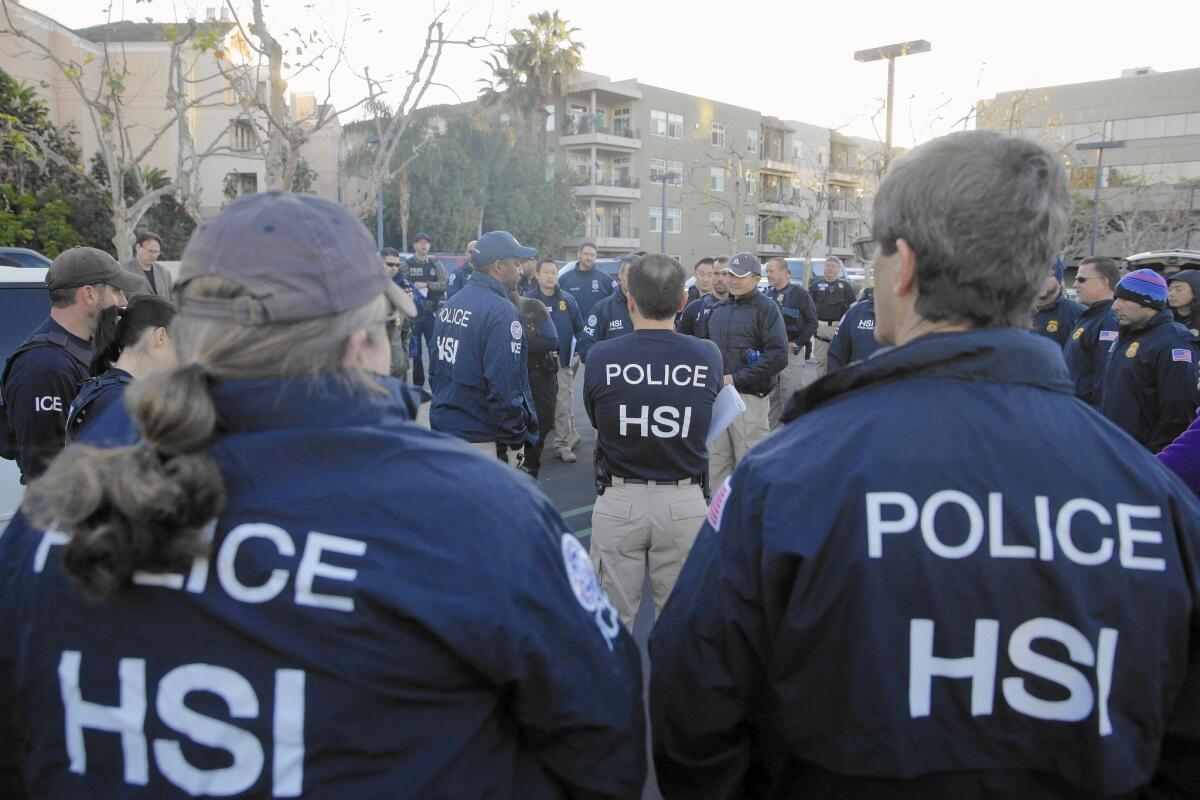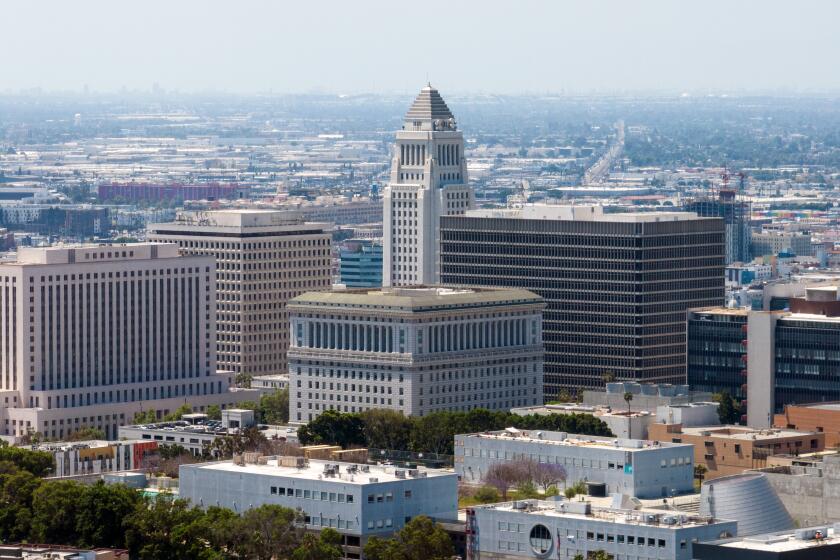The loaded term ‘anchor baby’ conceals complex issues

Federal agents raid an Irvine complex in March in an investigation of three birth tourism businesses catering to Chinese women.
Donald Trump proudly throws it around. Jeb Bush stumbled over it. And Hillary Clinton and other Democrats have decried it.
The loaded term “anchor babies” has become a lightning rod of the 2016 presidential campaign.
It is used as a pejorative, often meant to conjure images of women crossing the U.S.-Mexico border to give birth to children who are U.S. citizens and would shield them from deportation (though the parents of such children have been frequently deported). Bush gave the term another twist this week when he defended its use, then said, “Frankly, it’s more related to Asian people.”
The impulses driving immigrants to have children in the United States vary widely, as do the economic circumstances of those who drop “anchors.”
While some have children in the U.S. to gain economic advantages, Southern California has seen a boom in so-called maternity tourism, often involving well-to-do pregnant women from Asia who are in the United States legally.
Last year, federal agents targeted three Southern California businesses that helped pregnant Chinese women travel to the U.S., usually on tourist visas, so their children could be born U.S. citizens.
The heated debate comes at a time when some mainstream Republicans have urged the party to court Latino and Asian voters.
But Trump has shifted the dialogue on immigration by, among other things, coming out against birthright citizenship. He has forced more moderate candidates such as Bush to tack to the right, said Karthick Ramakrishnan, a political science professor at UC Riverside.
Ramakrishnan called Bush’s comments on Asians “both clumsy and offensive.”
Asians “were largely ignored before, and now they’ve been thrust into the limelight in a very divisive way,” he said Wednesday.
In the San Gabriel Valley and some other parts of Southern California, birthing hotels are an open secret.
Because it is not in and of itself illegal for a foreign national to give birth in the United States, birth tourism businesses for years have openly announced their services.
A website called ChineseInLA.com has more than 100 listings for maternity hotels in Arcadia, Irvine, Rowland Heights, Monterey Park and other local cities, with names such as USLoveBaby and Star Baby Care Center. In Arcadia, the phenomenon became so well known that the sight of an unfamiliar pregnant Asian woman has led some to call police.
“A lot of times, someone will see a pregnant woman of Asian descent walking around who they don’t know and think, hey, she’s here illegally and call us about it,” said Arcadia Police Lt. Roy Nakamura. “Sometimes it just ends up being a relative of a resident that resides here, and the home hasn’t been modified into a business.”
NEWSLETTER: Get the day’s top headlines from Times Editor Davan Maharaj >>
In 2013, the Arcadia Police Department assigned a full-time detective to handle complaints about birth tourism and other quality of life issues, Nakamura said.
Authorities investigate each complaint for violations of building codes and city ordinances, but say they have identified only one illegal birthing center.
Since 2013, complaints about birthing hotels have declined dramatically, he added.
As the practice has become better known and immigration officials more focused on it, pregnant women have been denied visas or refused entry into the U.S. That, in turn, appears to have pushed some businesses to attempt new ways to outsmart the system.
In search warrant affidavits filed earlier this year targeting three birth tourism businesses catering to Chinese women, agents wrote that would-be mothers were coached to lie on visa applications about the purpose and length of their stay. Businesses also allegedly helped alter or fabricate college diplomas and other documents about their employment and income level back home.
Charges have yet to be filed against the operators of the three businesses, which were based in Rowland Heights, Irvine and Rancho Cucamonga.
Greg Z. Chen, director of advocacy for the American Immigration Lawyers Assn., said the political debate was incorrectly portraying the birth tourism problem as a gaping loophole in immigration law.
“It’s a very small, fraudulent practice that immigration enforcement is already attuned to, and putting a lot of resources into combating,” he said.
Mark Krikorian, executive director of the Center for Immigration Studies, which favors restrictive immigration policies, said the term “anchor baby” traditionally applies to the American-born offspring of families who have settled in the U.S., and not to birth tourists.
Although birth tourism is not as widespread as illegal immigration, Krikorian said he is more disturbed by the practice because it grants citizenship to people who have no ties to the U.S.
In 2013, after media coverage of a Chino Hills maternity hotel triggered an increase in complaints, the Los Angeles County Board of Supervisors stepped up inspections and citations.
Through September of that year, county officials identified 28 maternity hotels, most in Rowland Heights and a few in Hacienda Heights, and shut down 18 of them.
The Department of Regional Planning concluded that an ordinance specifically directed at the hotels was unnecessary because most were in single-family residential areas where the current zoning code already prohibits them.
Others have also tried to regulate the businesses.
In 2013, then-Assemblyman Curt Hagman (R-Chino Hills) proposed classifying the operation of hotels in a residential zone as a misdemeanor punishable by steep fines. The bill was blocked in committee.
Last year, Chino Hills City Councilman Ed Graham asked the city to explore stronger restrictions on boarding houses, but the ordinance has not been brought to a vote.
Although birth tourism may be a small phenomenon, many U.S. citizen children have been born to parents in the country without legal status.
In 2012, the Pew Research Center estimated that 4 million immigrant parents in the country without authorization lived with their U.S.-born children.
Louis DeSipio, a professor of political science at UC Irvine, said the notion that parents have children in the U.S. to protect themselves from deportation is a departure from reality, pointing out that children who are U.S. citizens have to wait until they are 21 before starting the process of sponsoring a parent who is in the country without legal status.
“It would take an amazingly tactical or Machiavellian parent to somehow think that the child’s status protects the parents,” he said.
“They are not thinking 25 years in the future.”
Zenen Jaimes, 24, was born in Chicago to Mexican parents who came to the U.S. illegally in the 1990s after jobs dried up during an economic crisis in Mexico.
Having children to protect themselves from deportation, he said, “never even crossed their minds.”
“Once they got here they just went through the normal process of starting a family,” he said.
His mother was able to gain legal residency after his older brother — who was also born in the U.S. — sponsored her. But his legal status didn’t protect his father from deportation a few years ago.
“That’s the case for thousands of kids who grew up like me,” said Jaimes, who is now a policy analyst for United We Dream, which advocates for the rights of young immigrants.
Nancy Flores, a South Gate resident whose parents are Mexican immigrants, said she had never heard of the term “anchor baby” until her brother texted her this week after hearing that Trump had used the term.
Although Flores’ parents gave birth to her soon after they were able to legalize their status when President Reagan signed an amnesty bill in the 1980s, she said she took offense to the term because her parents came to the country without legal status.
Flores, who said her parents didn’t come with the intention of having children in the U.S., said she’s not a political person but does have an opinion.
All the talk, she said, will bring people like herself to the polls.
Hoy: Léa esta historia en español
[email protected]; Twitter: @frankshyong
[email protected]; Twitter: @cindychangLA
[email protected]; Twitter: @palomaesquivel
Times staff writers Victoria Kim and Cindy Carcamo contributed to this report.
MORE:
Robin Abcarian: ‘Anchor baby’ is a slur against Mexicans, and Trump should knock it off
Student starts #MyAsianAmericanStory in response to Bush remarks
Asian ‘anchor babies’: Wealthy Chinese come to Southern California to give birth
More to Read
Sign up for Essential California
The most important California stories and recommendations in your inbox every morning.
You may occasionally receive promotional content from the Los Angeles Times.













